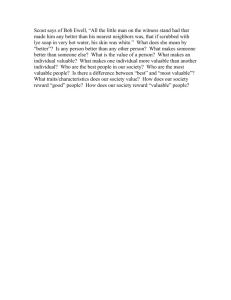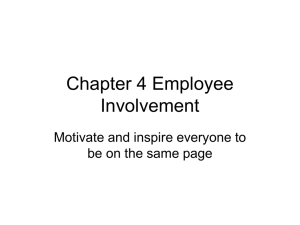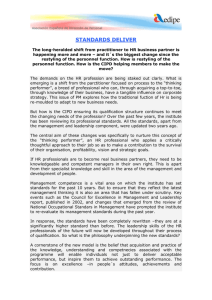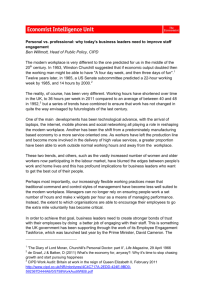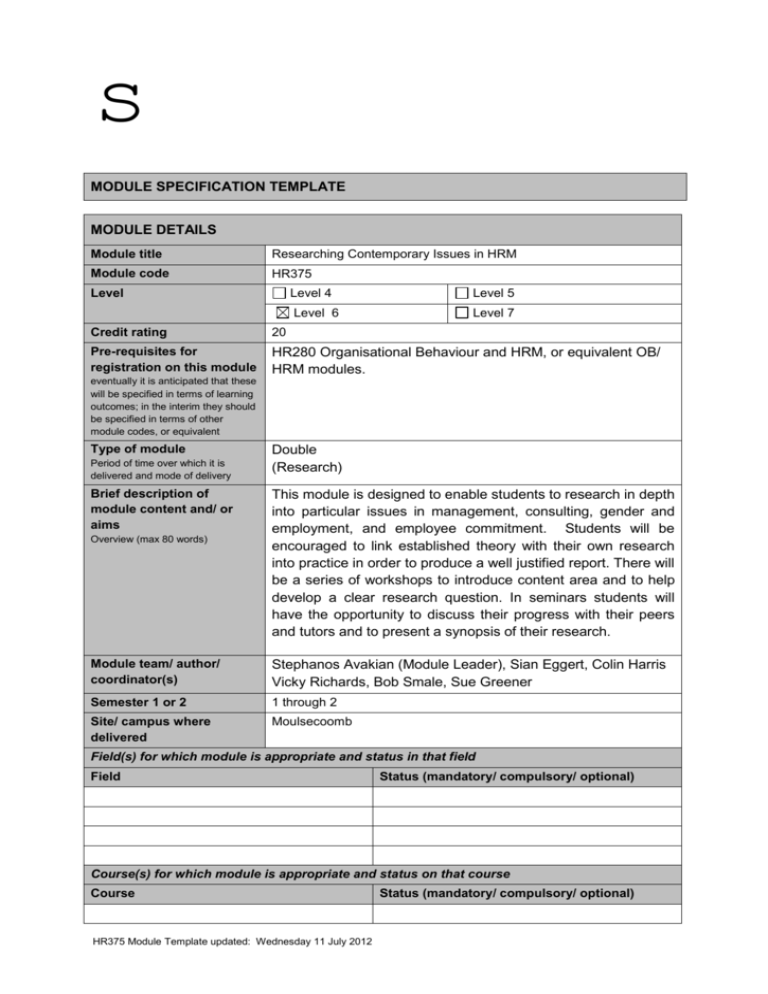
s
MODULE SPECIFICATION TEMPLATE
MODULE DETAILS
Module title
Researching Contemporary Issues in HRM
Module code
HR375
Level
Level 4
Level 5
Level 6
Level 7
Credit rating
20
Pre-requisites for
registration on this module
HR280 Organisational Behaviour and HRM, or equivalent OB/
HRM modules.
eventually it is anticipated that these
will be specified in terms of learning
outcomes; in the interim they should
be specified in terms of other
module codes, or equivalent
Type of module
Period of time over which it is
delivered and mode of delivery
Brief description of
module content and/ or
aims
Overview (max 80 words)
Double
(Research)
This module is designed to enable students to research in depth
into particular issues in management, consulting, gender and
employment, and employee commitment. Students will be
encouraged to link established theory with their own research
into practice in order to produce a well justified report. There will
be a series of workshops to introduce content area and to help
develop a clear research question. In seminars students will
have the opportunity to discuss their progress with their peers
and tutors and to present a synopsis of their research.
Module team/ author/
coordinator(s)
Stephanos Avakian (Module Leader), Sian Eggert, Colin Harris
Vicky Richards, Bob Smale, Sue Greener
Semester 1 or 2
1 through 2
Site/ campus where
delivered
Moulsecoomb
Field(s) for which module is appropriate and status in that field
Field
Status (mandatory/ compulsory/ optional)
Course(s) for which module is appropriate and status on that course
Course
HR375 Module Template updated: Wednesday 11 July 2012
Status (mandatory/ compulsory/ optional)
MODULE AIMS, ASSESSMENT AND SUPPORT
Aims
This module aims to provide students with the opportunity to select a specific,
contemporary issue in Human Resource Management to study in-depth. It is
anticipated that a topic within the following field areas:
A) Management consultancy
B) Gender & Employment
C) The Employment Relationship
D) Employee Commitment, Identification and Affinity
E) Τhe design and purpose of rewards
F) Human Resource Development
G) Blended Learning and E-Learning
Learning
outcome
s/
objective
s
On completion of this module the students should be able to:
Subject specific:
Critically evaluate the relevant scholarly literature concerned with a
contemporary issue in Human Resource Management
Critically evaluate primary and secondary material concerned with the
chosen topic.
Identify and evaluate approaches to the collection of primary HRM data
Investigate an HRM issue and, where possible, identify and evaluate
opportunities to enhance HRM’s effectiveness that has practical relevance
and application.
Successfully make links between theoretical concepts and practical
applications.
Present their studies in a clear, concise and appropriately structured
framework.
Cognitive:
ContentS
Identify a topic for research and frame an appropriate research
question.
Conduct desk research i.e. secondary research.
Review a wide range of published data (e.g. academic literature,
company, trade and government publications etc).
Analyse and synthesise relevant data.
Propose an appropriate design for primary research (field-work)
suitable for researching the topic under consideration.
The module leader will direct the student to the appropriate specialist tutor.
HR375 Module Template updated: Wednesday 11 July 2012
Management Consultancy
Aspects of recruitment, selection and development within management
consultants
Studying consulting in the context of performance management and rewards
Elements of career development issues within management consulting
Implications of reward related pay practices on the advice-giving process to
clients
The distribution and transfer of knowledge in the consultant-client relationship
How consultants generate and maintain their reputation to clients
How and why clients come to trust the consultants’ service
The legitimation of business value in the consultant-client relationship
Aspects of implementation and its necessity to the consulting service
Gender and Employment
UK and/or European/global perspective
History of gender roles in society and employment in particular
Influences of education; attitudes to male and female workers; trends in
workforce composition and occupational segregation
lifestyle choices and preferences
The legal context - issues of discrimination, equal opportunities, flexibility in
roles and skills and flexible working patterns
Pay and gender
Career choices and routes into management – glass ceiling/glass cliff/sticky
floors/ second earners/divorce rates and implications on work choices
Mentoring and Networking – developing social and psychological capital
Male and female entrepreneur
Generational and gender differences
Cross-cultural comparisons of female roles in work and society
The Employment Relationship
The changing nature of the employment relationship as experienced in
various work situations, including: full time employment, temporary and parttime employment, home working, redundancy and unemployment.
The political, legal, economic, social and technological influences on the
employment relationship.
The role of leadership and management in the employment relationship.
The role of trade unions in employee representation and collective bargaining.
The role of other actors in the employment relationship, including: employers,
employer organisations, government, the European Union and other
transnational organisations.
The nature of conflict in the employment relationship together methods of
individual and collective conflict resolution.
Employee communications including employee commitment, employee
engagement and employee voice.
The changing nature of, and influences upon, the psychological contract.
Employee Commitment, Identification and Affinity
How organisations have sought to use various management methods that
seek to enhance employees’ commitment to the organisation.
Initiatives that are aimed at making employees more ‘part of the firm’.
Various forms of employee ownership used by organisations to enhance
employee commitment and performance. This ranges from simple task
HR375 Module Template updated: Wednesday 11 July 2012
ownership to ‘real’ ownership in the form of shares, ‘partnership’ or employee
buyouts
The emotional aspects of organisations and their management. Of particular
interest here is the increase in the proportion of ‘front-line’ customer facing
jobs where it is vital that the encounters with customers are effectively
managed. There are two interesting issues here. First, how organisations
seek to ensure that the correct emotions are displayed by employees. And
second, how employees emotional stability is ‘managed’.
Employee voice - where historically employees have been represented by
trade unions who acted as their ‘voice’ to management. More recently
organisations have used ‘non-union’ voice mechanisms effectively sidelining
trade unions in an attempt to bring employees closer to the organisation and
its objectives..
Exploring the meaning of work-life balance. In a changing world where
employees’ report that they are working harder and for longer, the way in
which individuals maintain equilibrium between their work and non-work life is
of interest. Employer’s sell work-life balance as employee friendly - but is it?
This subject offers the opportunity to explore various related areas such as
email use, workplace stress, and gender differences
Design and Purpose of Rewards
The employee reward contribution
Strategic reward, reward strategy and policies
The contribution of reward achieving organisational objectives
Reward fit with corporate culture
Concepts of quality, fairness, consistency and transparency in rewards
Design, implementation and monitoring of equality
The legal framework
Cross cultural considerations
Key types of pay structures within organisations: purpose and types (e.g.
broad banded)
Linking pay structures and organisations
Purpose and use of job evaluation within organisations
Key types of job evaluation
Application within organisations: popularity, implementation and application
Contingent pay (e.g. performance related pay (PRP), competence-related
pay, skill-based pay, contribution-related pay)
Linking pay and performance
Benefits: role of benefits, flexible benefits
Financial and non-financial rewards
Pension arrangements, state and occupational arrangements, Pension
developments
Director / Executive pay boardroom pay and benefits
International reward: Managing rewards across international boundaries,
expatriate pay and pay for HCNs, PCNs and TCNs
Approaches to managing aspects of reward systems
Pay and benefit benchmarking: reward reports e.g. CIPD, e-reward, Hay
Communication, implementation and administration: internal expertise,
training and engaging reward consultants, use of IT
Reward system evaluation: reward surveys and monitoring
HR375 Module Template updated: Wednesday 11 July 2012
Human Resource Development (HRD)
Understanding the underpinning conceptual triggers behind the growing
attention on HRD
The effective design of development initiatives through education and training
Examining the learning processes that lead to development opportunities (e.g.
formal, informal, systematic, ad hoc)
Understanding the relationship between personal development and corporate
growth and performance
Evaluating development outcomes by using quantitative and qualitative
methods
Development through the design of career planning initiatives
The importance of coaching to transferring learning and knowledge
The role of mentoring and its constraints
Corporate and individual barriers and challenges to development initiatives
and how to overcome them
Teaching
and
learning
strategy
Allocation of
study hours
to activities
(including
pre-module
activities,
contact
time, private
study time
and
assessment
)
Blended Learning and E-learning
Understanding the learning theories and concepts underpinning technology
enhanced learning, in particular constructivist and connectivist theories
Evaluating arguments for and against the various opportunities for and
definitions of blended learning
Determining fit of e-learning strategies in the workplace
Contributing factors to adoption of e-learning at and for work including
resource availability and employee access
The developing role of Web 2.0 and social media in general in relation to
Continuing Professional Development and professional learning communities
Corporate and individual constraints on e-learning
The business case for e-learning and blended learning
Introductory workshops comprising discussion of specific topic areas, analysing
the impact of various influences on the employee and their relationship with the
organisation and discussion on how this will impact upon the students’ research.
Each student will be encouraged to develop a clear research question through a
process of peer and tutor review.
Research seminars will initially provide a forum for the student to discuss the
progress of their research and to receive peer and tutor feedback. Later
seminars will provide an opportunity or students to present their research for peer
and tutor comment and feedback, and also for assessment.
Lectures:
0
Seminars:
0
Workshops: 20
Open learning: 0
Self study:
180
Total: 200
Learning
support
Including
indicative
reading,
computer
packages,
field trips
Subject specific reading:
Management consultancy
Avakian, S. and Clark, T. (Eds.) The International Library of Critical Writings on
Business
and
Management:
Management
Consultancy.
Cheltenham: Edward Elgar Publishing
Clark, T. Managing Consultants: Consultancy as the Management of
HR375 Module Template updated: Wednesday 11 July 2012
etc
Impressions. Buckingham: Open University Press.
Kipping, M. and Engwall, L. (eds.) Management Consulting: The Emergence and
Dynamics of a Knowledge Industry. Oxford: Oxford University
Press
Maister, D. H., Green, C. H. and Galford, R. M. The Trusted Advisor. New York,
NY: Free Press.
McKenna, C. D. The World’s Newest Profession. Cambridge University Press.
Sturdy, A., Clark, T. Fincham, R. and Handley, K. Management Consultancy in
Action – Relationships, Knowledge and Power. Oxford: OUP
Gender and Employment
Cornelius, N. Human Resource Management: A Managerial Perspective.
Thomson Business Press
Daniels, K. Employee Relations in an Organisational Context. CIPD
Dibben, P. Gilton, K. & Wood, G. Employee Relations – A Critical & International
Approach. London: CIPD
Bach, S. (Ed) Managing Human Resources (4th Ed) Personnel Management in
Transition. Oxford: Blackwell
Beardwell, I. Holden, L. and Claydon, T. Human Resource Management. A
Contemporary Approach (4th Ed). London: FT Prentice Hall
The employment relationship
Bennett, R. Employee Relations. M&E Pitman.
Blyton, P. & Turnbull, P. The Dynamics of Employee Relations. Palgrave.
Bosch, G. Lehndorff, S. & Rubery, J. (eds). European Employment Models in
Flux. London: Palgrave Macmillan.
Bratton, J. & Gold, J. Human Resource Management. Palgrave
Budd, J. W. The Thought of Work, Cornell University Press.
Corby, S. & Symon, G. Working for the State, Basingstoke: Palgrave Macmillan
William, S. & Adam-Smith, D. Contemporary Employee Relations: A Critical Introduction. Oxford
University Press.
Employee commitment, identification and affinity
Ambrose, D. Healing the downsized organization. New York: Three
Rivers Press.
Ciulla, J. B. The working life—the promise and betrayal of modern work.
New York: Random House
Cox, A. Redefining corporate soul—Linking purpose and people.
Chicago: Irwin Professional Publishing
Dibble, S. Keeping your valuable employees—Retention strategies for
your organization’s most important resource. New York: John
Wiley and Sons. Inc
Thomas, K. W. Intrinsic motivation at work—Building energy and
commitment. San Francisco: Berrett-Koehle
O’Malley, M. N. Creating Commitment—How to attract and retain talented
employees by building relationships that last. New York: John
Wiley and Sons, Inc.
Researching the design and purpose of rewards
Armstrong, M. Employee Reward, CIPD
Armstrong, M. and Brown, D New Dimensions in Pay Management, CIPD
Armstrong, M. and Brown, D. Paying for Contribution: real performance-related
strategies, Kogan Page.
Armstrong, M. and Baron, A. The job evaluation handbook, CIPD
Armstrong, M. & Stephens, T. Employee Reward Management and Practice,
CIPD.
HR375 Module Template updated: Wednesday 11 July 2012
Armstrong, M. and Murlis, H. Reward Management: A Handbook of
Remuneration Strategy and Practice , CIPD.
Brown, D. Reward Strategies: from intent to impact, CIPD.
Holbeche, L. Aligning Human Resources and Business Strategy, Butterworth
Heinemann
Human Resource Development
Baruch, Y., Managing Careers: Theory and Practice, FT Prentice Hall.
Beardwell, I., Holden L., & Claydon, T., Human Resource Management,
FT/Prentice Hall.
Blanchard, P. N., and Thaker, J. W., Effective Training; Systems, Strategies, and
Practices, Pearson Prentice Hall.
Bratton, J., and Gold, J., Human Resource Management, Palgrave.
Clutterbuck, D., Everyone Needs a Mentor, IPD.
Cornelius, N., Human Resource Management: A Managerial Perspective,
Thomson Business Press.
Gibb, S., Learning and Development, Palgrave.
Hughes, M., Change Management, CIPD.
Noe, R.A., Employee Training and Development, McGraw Hill.
Blended Learning and E-Learning
Bonk, C.J. & Graham, C.R The handbook of blended learning: Global
perspectives, local designs. San Francisco, CA: Pfeiffer.
DeFillipi, R. & Wankel, C. (Eds), Educating managers with tomorrow’s
technologies,. Greenwich, CT: Information Age Publishing.
Garrison, D.R., & Anderson, T. E-learning in the 21st century: a framework for
research and practice. London: Routledge-Farmer
Macdonald, J. Blended learning and online tutoring London: Gower
Schön, D. The Reflective Practitioner. How professionals think in action. London:
Temple Smith.
Organisational Dynamics
Argyris. C., Overcoming Organizational Defenses. New Jersey: Prentice Hall
Beehr, T.A., Psychological Stress in the Workplace London: Routledge
Egan, G., The Shadow Side Management Today
Goleman, D., Vital Lies, Simple Truths. London: Bloomsbury
Hirschhorn, L., The Workplace Within. Massachusetts: MIT Press
Koestenbaum, P., and Block, P., Freedom and Accountability at Work San
Francisco: Jossey-Bass/Pfeiffer
Miles, M. and Huberman A., Qualitative Data analysis: A Sourcebook of New
Methods. Beverley Hills, CA: Sage
Saunders, N. K. Lewis, P. and A. Thornhill. Research methods for business
students. Harlow: Pearson.
Schaef, A. Wilson and Fassel, D., The Addictive Organisation. San Francisco:
Harper Collins
Sennett, R., The Corrosion of Character London: Norton
Watzlawick, P., The Situation is Hopeless, But Not Serious: The pursuit of
Unhappiness. London: Norton
Yin, R. K., Case Study Research Design and Methods. London: Sage
Zohar, D., ReWiring the Corporate Brain. San Franciso: Berrett-Koehler
Research Methods – the most recent editions of:
Auerbach, C. F. and Silverstin, L. B. Qualitative Data: An Introduction to Coding
and Analysis. London: New York University Press.
Bell, J. Doing your Research Project. Buckingham: Open University Press.
Easterby-Smith, M., Thorpe, R. and Lowe, A. Management Research: an
HR375 Module Template updated: Wednesday 11 July 2012
Introduction. London: Sage.
Glaser, B. and Strauss, A. The Discovery of Grounded Theory. Chicago: Aldine.
Miles, M. and Huberman A., Qualitative Data analysis: A Sourcebook of New
Methods. Beverley Hills, CA: Sage
Saunders, N. K. Lewis, P. and A. Thornhill. Research methods for business
students. Harlow: Pearson.
Yin, R. K., Case Study Research Design and Methods. London: Sage
Please note: students will receive further more comprehensive guidance on
reading appropriate to their research area
Journals
Academy of Management Journal
Academy of Management Executive
Academy of Management Perspectives
Empowerment in Organizations
Human Resource Development International
Human Resource Development Review
Journal of International Business Studies
Journal of Management Development
Journal of Managerial Psychology
Journal of Organizational Behaviour
Journal of Organization Change Management
Organizational Dynamics
The Leadership and Organization Development Journal
Participation and Empowerment: An International Journal
British Journal of Industrial Relations
Industrial Relations Journal
Journal of Occupational and Organisational Psychology
Work, Employment and Society
Gender, Work and Organisation
Personnel Review
Websites
www.acas.org
www.cipd.co.uk
www.e-reward.co.uk
www.equalityhumanrights.com
www.incomesdata.co.uk
www.employment-studies.co.uk
Assessm
ent tasks
Including
weighting of
individual
tasks
ASSESSMENT:
COURSEWORK (100%) COMPRISING
INDIVIDUAL PROJECT 6000 WORDS (-/+10%)
EXAMINATION INFORMATION
Area examination board
HR/OB
External examiners
Name
Date appointed
Beryl Badger
???
QUALITY ASSURANCE
Date of first approval
April 2012
HR375 Module Template updated: Wednesday 11 July 2012
Only complete where this is not the
first version
Date of last revision
Only complete where this is not the
first version
Date of approval for this
version
Version number
Modules replaced
HR371, HR372, HR383,
Specify codes of modules for which
this is a replacement
HR375 Module Template updated: Wednesday 11 July 2012

